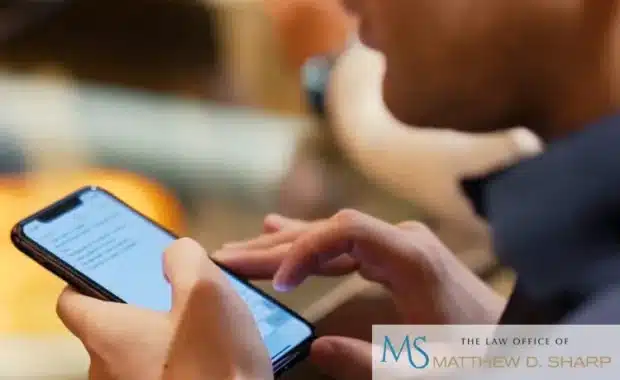In 2019, amidst the ongoing #MeToo movement, the Jussie Smollett case and the rise of sex assault allegations, we asked college students to write essays about what the penalties and punishments should be for false sex assault allegations in our first-ever scholarship content. Our winner, along with nearly all of the 110 other students who submitted essays, generally agreed that false allegations should be discouraged through criminal penalties such as fines and even jail time.
For our second essay contest, we decided to turn our focus on another growing problem: revenge porn.
What is revenge porn?
The term “revenge porn” describes the act of distributing sexually explicit images or videos of another person without their consent. Considered a form of psychological and sexual abuse, nonconsensual image sharing is most commonly perpetrated by an intimate partner (with or without the subject’s knowledge) and used to blackmail, exploit, coerce or punish the person depicted—possibly for financial gain.
Revenge porn statistics
How common is revenge porn?
More than you might think, as these findings show:
- It has been estimated that roughly 10 million Americans have been either threatened with or become victims of revenge porn. This equates to about 1 in 25 people. (source)
- Women under 30, minorities, and members of the LGBTQI+ community are more likely to be threatened with revenge porn than straight men.
- Well-known celebrities who have been victims of revenge porn include Jessica Lawrence, Kate Upton, and Rihanna.
- Among revenge porn victims, 93% reported significant emotional distress, while 82% reported suffering significant impairment in social, occupational, or other important areas of functioning. Over half (51%) of victims indicated that they had even considered committing suicide. (source)
- 46 states (plus D.C. and Guam) now have revenge porn laws on the books. Only 4 states (Massachusetts, Mississippi, South Carolina and Wyoming) lack such protections. (source)
- It appears that revenge porn rose during the pandemic lockdown. As of September 2020, the Revenge Porn Helpline received over 2,000 reports of non-consensual pornography in 2020—a 22 percent rise from last year. (source)
In light of these disturbing trends, we asked college students to comment on whether or not they thought laws punishing revenge porn ought to be more severe. Specifically, we asked students to submit their 300-500 word essay for a shot at a $1,000 scholarship privately funded by the Law Office of Matthew D. Sharp.
We’re thrilled to announce that we have selected our scholarship winner: Dominique Roberts—a veteran and biology student at Logan University in Chesterfield, Missouri. Congrats Dominique on your scholarship and thank you for your service!
Continue reading to see Dominique’s winning essay and learn more about her:
Should the laws against revenge porn be more severe? Why or why not?The very root of revenge pornography is removing the power of choice from the person or people it targets. Furthermore, the development, editing, sales, or release of this type of pornography is nonconsensual, and is a willful choice of the person who releases it. By these very two aspects of the definition or purpose of revenge pornography, every single state should have standing, strict laws that prohibit it, or have severe consequences if that law is broken. Currently 10 out of 50 states (criminal.findlaw.com) do not have any laws in place that address revenge pornography. 26 of the 40 states that do have laws against it classify first offenses as a misdemeanor of varying degrees, which can be fairly easily dropped, dismissed, or expunged from records. Crimes of a sexual nature that intend to strip power and consent from the victim should not ever be a misdemeanor. States’ rights may be a hotly contested issue, but when individuals in all states are affected, it is up to the country as a whole to protect individuals who are not in a position to protect themselves in these cases. Furthermore, with the development of social media, and the increasing inter-connectedness through smart phones, computers, and other wireless media, the spread of revenge pornography is akin to the effects of having a bonfire in a dry forest – the moment it is lit, it is out of the starter’s control, and the fire has spread beyond what can be contained and continues to spread until irreparable damage has occurred. But in the case of revenge pornography, the damage does not occur to the person who released it; when these videos make it online, they are always done so under an alias, via a VPN (virtual proxy network), and can ensure their work is wholly untraceable. The damage is done to the person whose face and body is on the screen for the world to see. Their self-esteem and most importantly, their dignity is bared against their will, and no one deserves that. The psychological damage that can stem from that can easily result are harmful at best, and tragic at worst. According to cybercivilrights.org, 51% of revenge pornography victims cited struggling with suicidal ideation. The consequences don’t stop at personal harm, however – personal relationships, professional opportunities and occupations, as well as just the ability to simply exist as the identity the victim has known themselves as their whole life are put at risk when the power is taken from. This damage cannot be undone, but increasing the standards of the laws across the United States as a whole can help ensure some semblance of closure is felt when their cases are heard in a court of law, or better yet – to ensure that the perpetrator doesn’t commit the crime to begin with, that the penalties can serve as a deterrent rather than a reactive force. |
About our scholarship winner

“In a country where we’re all taught to only look out for ourselves, I want to teach others to not be afraid to look out for someone else, too.”
– Dominique Roberts
Dominique Roberts is a 29-year-old disabled veteran of the United States Air Force. While on active duty, she was a Nuclear Weapons Technician, and she’s currently a Technical Order Publication Specialist where she writes and edits the very manuals she used to follow as a maintainer for our nation’s nuclear stockpile. She lives in Rio Rancho, New Mexico with her 3 dogs and 1 cat.
Following her time in service, Dominique has embraced some wildly varying interests. She discovered a newfound love of 3D printing (after receiving a 3D printer as a gift), and she knew she wanted to help her fellow veterans long-term. Finally, one day it dawned on her that the best way to do this was to return to school for her bachelor’s degree in Biology (followed by a Master’s degree) in order to become a practitioner in Prosthetics and Orthotics. She also wants to fabricate modern, electronic, custom prosthetic and orthotic devices for veterans using 3D printing and additive manufacturing based on their lifestyle needs and personalities (with no financial burden on them if they’re unable to pay).
Dominique believes that the current VA healthcare system isn’t able to meet the demands of disabled veterans in this area (or most other realms) of veteran needs, even as we have more service members returning daily from active duty. Though this doesn’t address all the needs that all veterans have, it is the way that she is best equipped to help by way of her knowledge and skillsets.
In her own diagnosis with disability following service, Dominique has gained something she never expected – a greater sense of empathy towards others as a whole.
Do you have what it takes to win our next scholarship essay contest?
While this scholarship contest has ended, our firm is committed to offering scholarships to eligible college students. We invite you to visit our Scholarship page to see when the next contest will start and find out how to participate.
If you have any questions about the essay requirements or the selection process, feel free to contact us.





